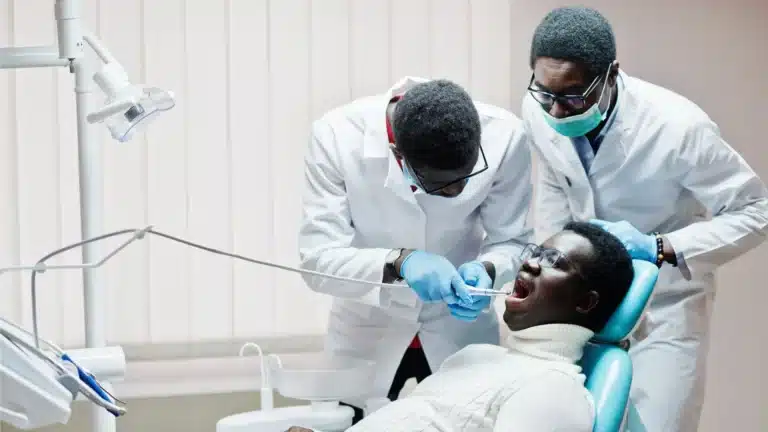Table of Contents
Are you thinking about becoming a dentist? It’s a fantastic career path. Dental education is expensive, but don’t let that stop you; there are plenty of ways to cover the costs. Let’s explore how to pay for dental school.
Dentists are in high demand today, especially with older people needing more complex dental work. Nowadays, people care more about their teeth than ever before. Good dental health affects your whole body’s well-being.
The journey takes about eight years – four in college and four in dental school. While new dentists might start with smaller paychecks, experienced dentists typically earn around $164,000 yearly. But here is the problem: most graduates walk out with about $305,000 in loans. So, if you want to pursue this path, thorough research and proper planning are the way forward.
Understanding the Cost of Dental School
Now, let us understand the actual costs involved in dental school.
Most students spend between $250,000 and $500,000, with private schools hitting the higher end. This covers basic costs like your tuition and dental school fees. However, there are many more expenses like rent, food, and hanging out with friends.
There is also one thing that people usually forget: while you are spending four years in dental school, you are not working full time, which means you are missing out on the possible income you can earn in these years. Think about what you could earn if you entered work after college. Sounds scary? Maybe. But many dental students say the career rewards make up for these early challenges. Just go in knowing what it’ll cost you in terms of money and time.
Scholarships: Finding Free Money for Dental Education
Paying for dental education can be made easier through various funding sources. The main option is getting scholarships, which schools and organizations give based on your grades or financial situation. Many dental colleges help their students with money, while other groups support future dentists.
You can go for scholarships on websites like Fastweb. Start your search early to meet all deadlines.
Besides scholarships, you can get student loans from banks or the government, but check their terms carefully.
Some schools also let you work part-time on campus. Remember to read all rules carefully – some money might only be for students from certain areas or backgrounds. Plan and understand what each program needs from you.
Grants: Need-Based Financial Aid Options
Money for dental school is available if you look in the right places. The best way to start is by completing FAFSA. Based on your family’s money situation, you might get free grants you never have to repay.
Check with dental schools, government programs, and dental groups. Act quickly; these opportunities go fast.
Also Read: Dental Disability Insurance
Service Commitment Programs
Do you need help in paying for dental school? You can join the military or work in small-town clinics through the Health Service Corporations. They will help you with school costs if you promise to serve afterward. It’s a big commitment, but it’s perfect if you dream of helping your country or working in small communities.
Federal Student Loans: What You Need to Know
Another way to pay for dental school is through federal student aid. Need money for school? Fill out FAFSA to see if you qualify for Federal Student Loans.
You might get free grants (no payback needed), loans (must repay with interest), or work-study jobs. But it’s not guaranteed – they look at your finances, grades, and school status. Apply early so that you get the best deals.
Also, check out dental school scholarships and private funding, but read the fine print.
Private Student Loans: Pros and Cons
If you’re considering dental school costs, banks, and lenders offer private student loans as another option. These loans can help with school fees and daily expenses.
While they might let you borrow more money than government loans and give you different payment choices, remember they usually come with more significant interest charges. You can pick plans like paying just the interest during school or waiting until graduation to start payments. But you should watch these loans, which often cost more in the long run and don’t have the same safety nets as government loans. Think carefully about all loan details and costs before signing up.
Work-Study Programs and Part-Time Jobs
Having a side job during dental studies can help cover school fees and daily costs. While juggling work and classes isn’t easy, good planning makes it work.
Making daily schedules and knowing which tasks matter most helps handle both areas well. Many dental schools can connect you with relevant part-time work or training positions to boost your career.
Crowdfunding Your Dental Education
Nowadays, getting help for dental school is easier with websites like GoFundMe. You just have to tell your personal story honestly and share why you want to be a dentist and what drives you. Send your message to friends, family, and social media followers.
Though success varies, many students get helpful donations from people who want to support their dreams. Even small amounts add up when paying for dental school.
Budgeting and Saving Tips for Dental School
Thanks to online crowdfunding, funding your path to becoming a dentist has taken an exciting turn. By opening up about your journey and passion for dentistry, you can connect with people who might help. Share your story with loved ones and your online network. Students get different amounts of money, and many future dentists have found kind people ready to help with donations.
Remember, every dollar counts when you’re working toward your dental degree. This approach might be worth trying alongside traditional funding options.
Also Read: A Guide to Affordable Dental Care Options
How Beem Can Help You Manage Dental School Expenses
Dental school can be cheaper if you are smart about daily costs. The Better Financial Feed™ on Beem can help you with this. Beem generates an automatic personalized budget plan that helps you stay on top of your goals.
You can share an apartment with friends or pick a place far from school; these things will help you save lots of money on rent.
You can skip using a car and walk, cycle, or hop on a bus to reach your dental school. It works just amazing and keeps more cash in your pocket.
Plus, your dental school’s office can recommend budget-friendly places to live and ways to get around town.
Conclusion
Now that you know how to pay for dental school, it helps to stay a few steps ahead. This means planning for the future while you are still studying dentistry. Decide whether to open your clinic or join someone else’s practice.
Learn about startup costs like buying dental tools and paying staff.
The dental school you choose will teach you about running a business and finding jobs.
It helps to explore all the ways to pay for school, from scholarships to loans. Do your homework on each option to pick what works best for you.
Remember to download the Beem app for all the guidance you need on saving, spending, earning, and investing.
FAQs on How to Pay for Dental School
What are the best scholarships for dental school?
The National Health Service Corporation offers full-tuition scholarships for students willing to work in underserved areas after graduation. Other top options include the Health Professions Scholarship Program from the military and merit-based awards from individual dental schools, which often cover significant portions of tuition.
How do service commitment programs work for dental students?
These programs offer loan repayment or tuition coverage in exchange for dentists working in specific areas after graduation. Programs like NHSC require dentists to practice for 2-4 years in underserved communities, while military programs trade service as military dentists for paid dental education.
Can I use crowdfunding to pay for dental school?
Yes, you can use crowdfunding to pay for dental school. Crowdfunding through platforms like GoFundMe can help cover your dental school costs. You can share your story, career goals, and financial needs on social media to reach potential donors. While it might not fund your entire education, successful campaigns often raise helpful amounts through community support.














































